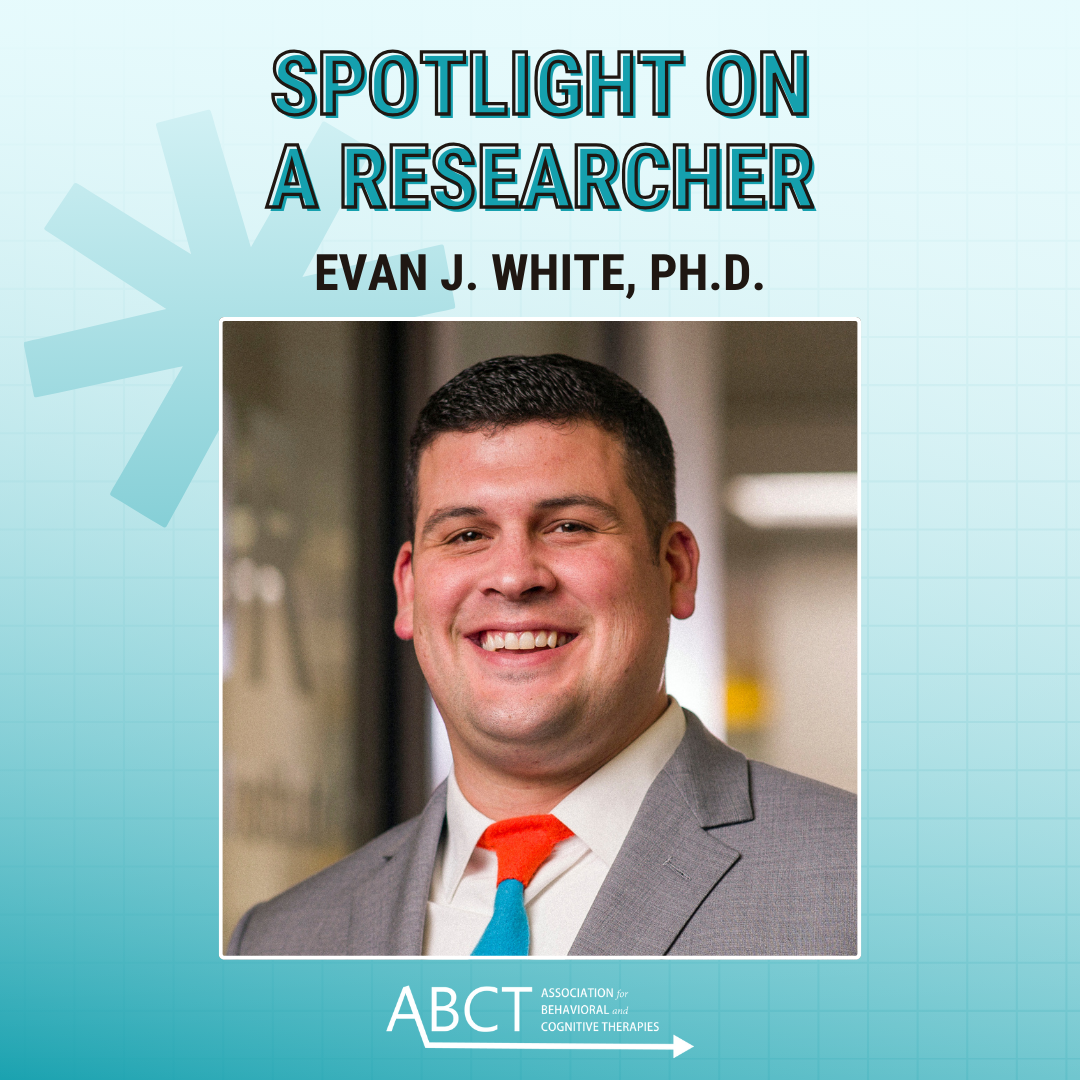Find a CBT Therapist
Search through our directory of local clinicians.
Evan J. White
Spotlight on a Researcher

Evan White, Ph.D., is an enrolled member of the Absentee Shawnee Tribe of Oklahoma. He belongs to the Shawnee Chapter of the Native American Church of Oklahoma and the Whiteoak Shawnee Ceremonial Grounds. He received his bachelor’s degree in psychology from Oklahoma State University.
He completed his master’s and doctoral education in clinical psychology at Oklahoma State University under the mentorship of DeMond M. Grant, Ph.D. His graduate research focused on employing psychophysiological techniques to test predictions from cognitive models of mood and anxiety disorders. His clinical training was generalist clinical science broadly with an emphasis in adult outpatient treatment of anxiety, mood, and trauma-related disorders using evidence-based psychotherapy approaches.
He completed his predoctoral clinical internship at the Charleston Consortium (Medical University of South Carolina/ Ralph H. Johnson VA Medical Center) working closely with his research preceptor Lisa McTeague, Ph.D.
He is currently a Principal Investigator, Director of Native American Research and Director of the Electroencephalography Core at the Laureate Institute for Brain Research. The focus of his work is employing clinical cultural neuroscience to improve mental health outcomes among American Indians by implementing multi-modal neuroscience and psychophysiology. A particularly novel component of this work is integrating community engaged research methods in working with AI communities and Tribal partners.
The goal of Dr. White’s research is to integrate clinical and cultural neuroscience to identify modifiable factors as candidate treatment targets for mental health intervention and prevention.
How did you first become involved in research? What was this first research experience like?
I first became involved in research at Oklahoma State University as an undergraduate research assistant in Dr. DeMond Grant’s Laboratory of Emotion And Psychophysiology. I was taking Dr. Grant’s statistic course and learned of the opportunity to join his lab and assist with running participants through experimental sessions that included cognitive-behavioral tasks and psychophysiological measurement.
This experience afforded me the opportunity to get experience collecting, cleaning, and analyzing psychophysiological data including EEG as well as learn the basics of human subjects research. I was able to learn about the field of emotion and psychophysiology related to mood and anxiety disorders. I was able to complete supervised research and present that research at local and national conferences. This was certainly a pivotal experience in my undergraduate training that set me on a course to pursue a career in research.
Has your approach to research changed over the course of your career? If so, how has it changed?
My approach to research has certainly broadened, which I think is not uncommon as a program of research progresses. Specifically, my background in cognitive behavioral empirical paradigms paired with psychophysiological measurement provided a strong foundation for a career in clinical research. During a post-doctoral fellowship with Dr. Robin Aupperle, I received the opportunity to explore ways I could apply my research training to serving needs in the Native American community in Oklahoma. I was drawn to this work based on my own Native identity and connection to various communities in Oklahoma.
In pursuing this work my research approach has broadened greatly to include community engaged research methods and a wider approach to data collection which includes qualitative methods. Thus, now my lab focuses on integrating qualitative and quantitative data, leveraging tools of clinical and translational neuroscience, and prioritizing community input of the research we are conducting.
What have you found most rewarding about your research?
When I think of the rewarding elements of my work, three specific things come to mind.
- 1. The excitement and creativity of pursuing unanswered questions using the tools of science. It is such a privilege to be able to apply my time and energy toward identifying problems and working to provide novel solutions through clinical science.
- 2. The process of mentoring and training emerging scholars. Being able to play even a small role in the development of trainees at any level is a real passion of mine and I believe it stems from having benefited from excellent mentorship during my training and even still.
- 3. Last but not least is being able to work closely with community partners to help set the priorities and process for the research that we are doing. It is rewarding to be able to structure our work such that its stands to have direct applicability in the communities we are serving. It is a different way of thinking about impact than is typical in academia, but I find it very rewarding.
If you weren’t pursuing a career in psychology, what would you be doing?
I really can’t imagine doing anything else for my career, but if I weren’t doing research, I think I would be pursuing my first true love – baseball. I played baseball ever since I could walk and even played a little in my sophomore year of college. While I have no delusions that I would still be playing, I think I could have found a meaningful career in teaching and coaching. Fortunately for me, I get to be involved coaching my son’s Tee-ball team.
My Account Info
Manage your Membership information, email preferences, and more.
Journals
Membership in ABCT grants you access to three journals.
Convention
We are now accepting Abstract submissions for Continuing Education Ticketed Sessions at the 2024 ABCT Convention in Philadelphia, PA.
My Account Info
Manage your Membership information, email preferences, and more.
Journals
Membership in ABCT grants you access to three journals.
Convention
We are now accepting Abstract submissions for Continuing Education Ticketed Sessions at the 2024 ABCT Convention in Philadelphia, PA.
